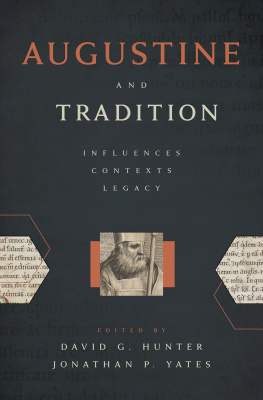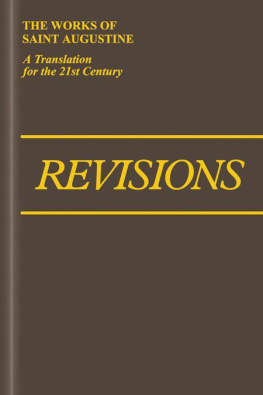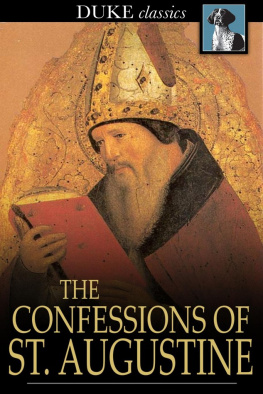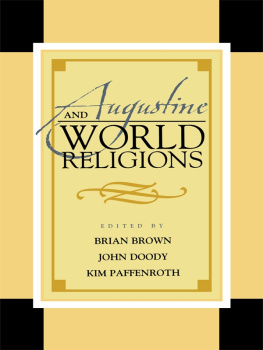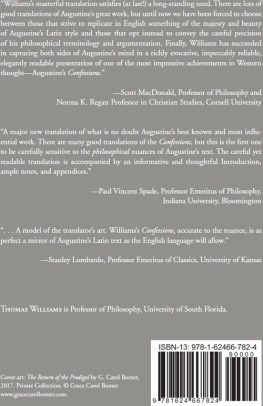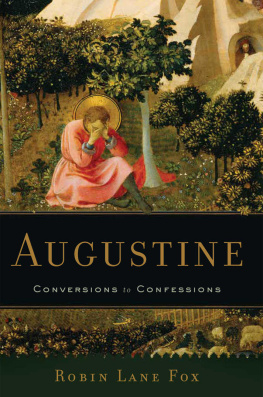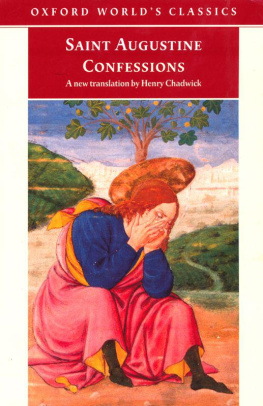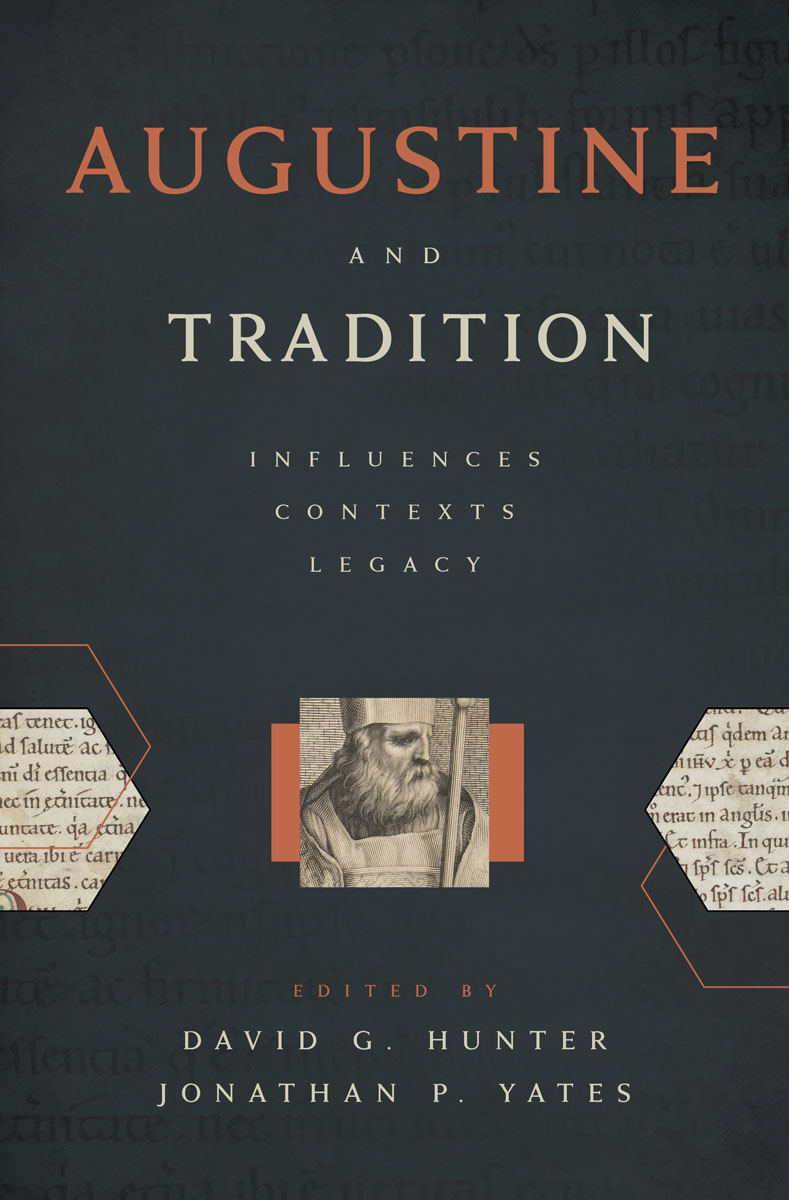

Wm. B. Eerdmans Publishing Co.
4035 Park East Court SE, Grand Rapids, Michigan 49546
www.eerdmans.com
2021 David G. Hunter and Jonathan P. Yates
All rights reserved
Published 2021
Printed in the United States of America
27 26 25 24 23 22 21 1 2 3 4 5 6 7
ISBN 978-0-8028-7699-7
Library of Congress Cataloging-in-Publication Data
Names: Hunter, David G., editor. | Yates, Jonathan, 1969 editor.
Title: Augustine and tradition : influences, contexts, legacy ; essays in honor of J. Patout Burns / edited by David G. Hunter and Jonathan P. Yates.
Description: Grand Rapids, Michigan : Wm. B. Eerdmans Publishing Co., 2021. | Includes bibliographical references and index. | Summary: An analysis of Augustines life and writings in the context of other traditionsthose preceding him and contemporary with himas a way of better understanding his significance in religious and cultural heritageProvided by publisher.
Identifiers: LCCN 2021021561 | ISBN 9780802876997
Subjects: LCSH: Augustine, of Hippo, Saint, 354-430. | LCGFT: Essays.
Classification: LCC BR65.A9 A8625 2021 | DDC 270.2092dc23
LC record available at https://lccn.loc.gov/2021021561
C ONTENTS
I
AUGUSTINE AND THE NORTH AFRICAN TRADITION
1. Augustines Rhetorical Reading of Genesis in Confessiones 1112
Michael Cameron
2. Augustine and the North African Liturgical Reading Tradition
Andrew McGowan
3. Augustine and Tertullian
Geoffrey D. Dunn
4. Augustine and the North African Martyriological Tradition
William Tabbernee
5. Augustine and Optatus of Milevis
Alden Bass
II
AUGUSTINE AND THE PHILOSOPHICAL AND LITERARY TRADITION
6. Augustine and the Platonists
John Peter Kenney
7. Augustine and Porphyry
Thomas Clemmons
8. Augustine and the End of Classical Ethics
James R. Wetzel
9. Augustine and the Classical Latin Literary Tradition
Dennis Trout
III
AUGUSTINE AND THE GREEK PATRISTIC TRADITION
10. Augustines Reception of Origen
Joseph W. Trigg
11. Augustines Anti-Pelagian Reception of Basil of Caesarea and Gregory of Nazianzus
Mark DelCogliano
IV
AUGUSTINE AND HIS LATIN CONTEMPORARIES/SUCCESSORS
12. Augustine and Marius Victorinus
Stephen A. Cooper
13. Augustine and Ambrose
John C. Cavadini
14. Augustine and Ambrosiaster
Theodore de Bruyn
15. Augustines Enchiridion 26.100 and the Ninth-Century Predestination Debate
Brian Matz
A CKNOWLEDGMENTS
T he editors gratefully acknowledge the Cottrill-Rolfes Chair of Catholic Studies at the University of Kentucky for providing a subvention that made possible the publication of this volume. At Boston College Mr. Austin J. Holmes and Mr. Jordan Parro, PhD students in theology, provided valuable editorial assistance in the final phases of its preparation.
The editors also wish to acknowledge that the late Professor Maureen Tilley, who collaborated closely with Professor J. Patout Burns on studies of early Christianity in North Africa, would have been a very willing contributor to this volume if her untimely death had not intervened. Her presence is deeply missed.
I NTRODUCTION
T he present volume took its first steps toward becoming reality over the course of one particular morning. It was Sunday, November 20, 2016, and we (Jonathan and David) had just finished breakfast at Davids hotel in San Antonio, Texas. We were both in Texas for the Annual Meeting of the American Academy of Religion and the Society of Biblical Literature. The weather was particularly nice, so we decided to take in the Riverwalk, which had not yet become busy. As we were walking, we stopped on a landing of one of the many staircases that connect the two levels of the area and began to discuss in earnest whether or not something like this collection might actually be feasible. It was not our first discussion of this project, yet we both recognized that the time had come either to commit to the project or to let it goregardless of its merit, much less of the considerable merits and contributions of its honoree, J. Patout Burns. By the end of 2016, the arrangements had been made and the project was underway.
Our original plan was to have the volume literally in hand in time to honor Patout on the occasion of his eightieth birthday, which would be celebrated in October of 2019. While that proved impossible for several reasons, we persevered, convinced that, whenever we finally handed Patout his copy, the investments of all involved would be well compensated. As we began to plan the volumes contents, we quickly recognized that Patouts wide-ranging and long-running contributions both to systematic theology and to historical theology would make finding the necessary common ground for a single volume a challenge. In the end, we decided that Augustine of Hippo should be the focus. Not only do both of us have expertise in this area of study (one that continues to attract historians, theologians, philosophers, and ethicists from all over the world), but it is arguably the area that Patout himself knows best, his aforementioned expansiveness notwithstanding.
The title we settled on is Augustine and Tradition: Influences, Contexts, Legacy . While we never lost sight of the goal to add to current scholarship on Augustine himself, we determined that it would be useful to examine Augustines relationship to the traditions that preceded him and to some of his most important Christian contemporaries. These would necessarily include literary, theological, and philosophical traditions, as well as scripture and liturgy. We also wanted it, as Patouts own research and writing have frequently done, to begin with the Christian traditions of North Africa and the Mediterranean world, as well as those representatives of Greco-Roman culture who exerted the most influence on Augustine. The unifying theme of this volume is contained in the following questions: To what extent did Augustines thought, teaching, or exegesis converge with or diverge from the traditions of his day? How did the cultural traditions of late antiquity shape him and how did he shape them?
Choosing appropriate contributors to this volume proved to be a challenge, albeit a gratifying one. While we considered it desirable that contributors have some direct connection to Patout either as friends, colleagues, or former students, it was also essential that they be experts in the areas that had to be covered, which ranged widely across the cultural fields of late antiquity. Fortunately, Patouts range has been equally wide, and we were able to invite a spectrum of scholars, junior and senior, to write on the required topics. As the table of contents shows, we were able to recruit experts in North African liturgy and martyrology (Andrew McGowan and William Tabbernee) as well as scriptural interpretation (Michael Cameron); essays on the North African writers Tertullian and Optatus of Milevis also appear (Geoffrey Dunn and Alden Bass). Augustines relation to prior philosophical traditions naturally looms large in a volume such as this, and several chapters are devoted to Neoplatonic and other philosophical influences (John Peter Kenney, Thomas Clemmons, and James Wetzel) as well as to the classical Latin literary tradition (Dennis Trout). Lastly, we were fortunate to enlist studies on several Greek patristic theologians, Origen and the Cappadocians (Joseph Trigg and Mark DelCogliano), and a variety of Augustines Latin predecessors and contemporaries, Marius Victorinus (Stephen Cooper), Ambrosiaster (Theodore de Bruyn), and Ambrose (John C. Cavadini). The collection is rounded out with a chapter on Augustines Nachleben in the ninth-century theological controversies on predestination (Brian Matz).
Next page
